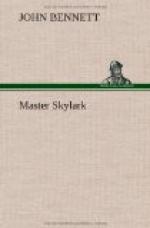Master Gyles closed the great door and pulled a cord that hung by the stage. A bell jangled faintly somewhere in the wall. Nick heard the muffled voices hush, and then a shuffling tramp of slippered feet came up the outer stair.
“Pouf!” said the precentor, crustily. “Tempus fugit—that is to say, we have no time to waste. So, marry, boy, venite, exultemus—in other words, if thou canst sing, be up and at it. Come, cantate—sing, I bid thee, and that instanter—if thou canst sing at all.”
The under-masters and monitors were pushing the boys into their seats. Carew pointed to the stage. “Thou’lt do thy level best!” he said in a low, hard tone, and something clashed beneath his cloak like steel on steel.
Nick went up the steps behind the screen. It seemed cold in the room; he had not noticed it before. Yet there were sweat-drops upon his forehead. He felt as if he were a jackanapes he had seen once at the Stratford fair, which wore a crimson jerkin and a cap. The man who had the jackanapes played upon a pipe and a tabor; and when he said, “Dance!” the jackanapes danced, for it was sorely afraid of the man. Yet when Nick looked around and did not see the master-player anywhere in the hall, he felt exceedingly lonely all at once without him, though he both feared and hated him.
There still was a shuffling of feet and a low talking; but soon it became very quiet, and they all seemed to be waiting for him to begin. He did not care, but supposed he might as well: what else could he do?
There was a clock somewhere ticking quickly with its sharp, metallic ring. As he listened, lonely, his heart cried out for home. In his fancy the wind seemed rippling over the Avon, and the elm-leaves rustled like rain upon the roof above his bed. There were red and white wild-roses in the hedge, and in the air a smell of clover and of new-mown hay. The mowers would be working in the clover in the moonlight. He could almost see the sweep of the shining scythes, and hear the chink-a-chank, chink-a-chank of the whetstone on the long, curving blades. Chink-a-chank, chink-a-chank—’twas but the clock, and he in London town.
Carew, sitting there behind the carven prompter’s-screen, put down his head between his hands and listened. There were murmurings a little while, then silence. Would the boy never begin? He pressed his knuckles into his temples and waited. Bow Bells rang out the hour; but the room was as still as a deep sleep. Would the boy never begin?
The precentor sniffed. It was a contemptuous, incredulous sniff. Carew looked up—his lips white, a fierce red spot in each cheek. He was talking to himself. “By the whistle of the Lord High Admiral!” he said—but there he stopped and held his breath. Nick was singing.
Only the old madrigal, with its half-forgotten words that other generations sang before they fell asleep. How queer it sounded there! It was a very simple tune, too; yet, as he sang, the old precentor started from his chair and pressed his wrinkled hands together against his breast. He quite forgot the sneer upon his face, and it went fading out like breath from a frosty pane.




